

Are You Washing Your Hands With This Toxic Pesticide? By Elisha McFarland ND Guest Writer for Wake Up World Triclosan, found in common “antibacterial” products, is linked to impaired muscle function and hormone disruption.
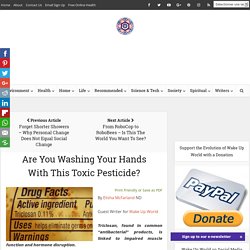
If you take a look at the label on your anti-bacterial soap, you may see the chemical triclosan listed. If you haven’t heard of triclosan, you should know that is in a number of home and personal care products that you may be using on a daily basis. Triclosan was introduced to the marketplace in 1972, although it was originally developed and registered as a pesticide in 1969. (1) At that time it was used in hospitals and health care settings for its antibacterial properties. Triclosan can also appear in products branded Microban®, Irgasan® (DP 300 or PG 60), or on products labeled “built-in antimicrobial protection.” Why should I be concerned about triclosan? A study led by researchers at UC Davis concluded that triclosan hinders muscle function in both animals and humans. Triclosan impairs muscle function.
Dr. FLUORIDE DAMAGE. 088 Mercury & Fluoride, a Tale of two Prescriptions. It's not just natural and synthetic fibers in your clothes — there are plenty of chemicals too. The US Federal Trade Commission has something to say about what you wear.
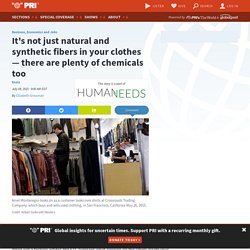
While not a fashion arbiter, the FTC oversees what appears on the labels inside your clothes. As the federal agency responsible for enforcing the Textile Products Identification Act and related laws, it makes sure clothing is accurately labeled with its fabric content. Are Dryer Sheets Toxic for Our Health? Laundry and the dryer are part of everyone's home life, and one of the products most used for this purpose is the dryer sheet.
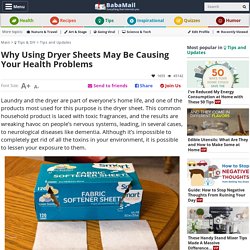
This common household product is laced with toxic fragrances, and the results are wreaking havoc on people’s nervous systems, leading, in several cases, to neurological diseases like dementia. Although it’s impossible to completely get rid of all the toxins in your environment, it is possible to lessen your exposure to them. Some people have the time, space and live in the correct climate for drying clothes on a washing line, but most of us have to make use of a dryer. Many people pop in dryer sheets without concern, because they make laundry soft, fragrant and static free.
Few people suspect what this product really contains. Is Your Makeup Killing You? Reverse The Damage! Photo credit: bigstock.com It’s not surprising that cosmetics is a multibillion dollar industry.
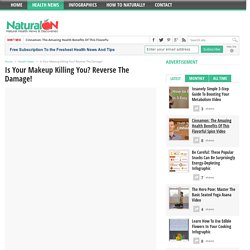
The desire to make ourselves look our best so we can improve how others perceive us and attract a mate is one of the most powerful instincts we have. It’s what leads billions of people, particularly young women, to purchase all manner of cosmetic goods to enhance beauty. But new research shows that many common makeup items may have harmful ingredients that can contribute to the disruption of vital functions in your body. Keep reading to find out what the facts are, how you can reverse the damage (it’s easier than you think!) There are many chemicals with potentially harmful effects that are used in cosmetic products, but some of the most common include the following. 1. Mounting data suggest antibacterial soaps do more harm than good. Whether you’re coming home from an airport fluttering with international germs, a daycare full of sticky-fingered toddlers, or just a grimy office building, scrubbing your hands with bacteria-busting soap seems like a great idea.
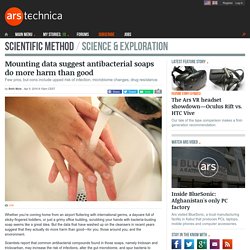
But the data that have washed up on the cleansers in recent years suggest that they actually do more harm than good—for you, those around you, and the environment. Scientists report that common antibacterial compounds found in those soaps, namely triclosan and triclocarban, may increase the risk of infections, alter the gut microbiome, and spur bacteria to become resistant to prescription antibiotics.
Meanwhile, proof of the soaps’ benefits is slim. There are specific circumstances in which those antimicrobials can be useful, civil engineer Patrick McNamara of Marquette University in Milwaukee told Ars. And the point hasn’t been lost on the US Food and Drug Administration. Sullied Soaps In rats exposed to triclosan, Dr. But, Dr. Herbicide-Contamination Sparks Recall of 3100 Boxes of Organic Panty Liners. Roundup is being found everywhere!
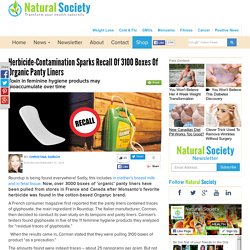
Sadly, this includes in mother’s breast milk and in fetal tissue. Now, over 3000 boxes of ‘organic’ panty liners have been pulled from stores in France and Canada after Monsanto’s favorite herbicide was found in the cotton-based Organyc brand. A French consumer magazine first reported that the panty liners contained traces of glyphosate, the main ingredient in Roundup. The Italian manufacturer, Corman, then decided to conduct its own study on its tampons and panty liners. Beware of Deodorants and Antiperspirants, Especially The "Safe" and "All Natural" Ones - The Health Wyze Report.
Your Kids Are Poisoning Themselves With One Thing You Have In Your Purse! Photo credit: bigstock.com You might have heard a story recently on mainstream news channels about a 6 year old in Atlanta that somehow got drunk at school.
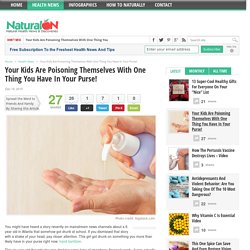
If you dismissed that story with a shake of your head, pay closer attention. This girl got drunk on something you more than likely have in your purse right now: hand sanitizer. This six year old thought she was drinking some type of strawberry flavored candy. It was actually hand sanitizer. The amount of alcohol in these everyday hand sanitizers ranges anywhere between 45 percent and 95 percent. Some teens are also consuming hand sanitizer but this is especially dangerous for children under 12 as their smaller bodies cannot handle as much alcohol. Although some children consume hand sanitizers with the intention of getting drunk, others are doing it on a dare or under peer pressure. Many hand sanitizers now come in orange, grape, and strawberry flavors that appeal to children.
Continue to Page 2 References: Georgiapoisoncenter.org. Are Cosmetics Killing Us? Video. Are You Washing Your Hands With This Toxic Pesticide? 1st December 2015 By Elisha McFarland ND Guest Writer for Wake Up World Triclosan, found in common “antibacterial” products, is linked to impaired muscle function and hormone disruption.

If you take a look at the label on your anti-bacterial soap, you may see the chemical triclosan listed.